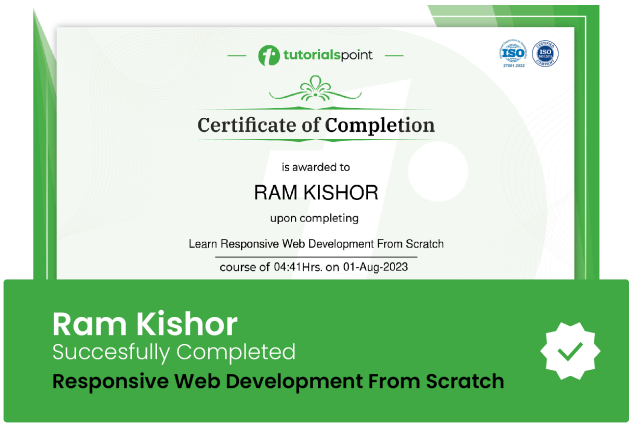Communication Masterclass
Build Strong Relationships

Lectures -39
Duration -2 hours

30-days Money-Back Guarantee
Get your team access to 10000+ top Tutorials Point courses anytime, anywhere.
Course Description
Demonstrating strong communication skills is about being able to convey information to others in a simple and unambiguous way. Good communication is about understanding instructions, acquiring new skills, making requests, asking questions, and relaying information with ease
While it takes time and practice, communication and interpersonal skills are certainly able to be both increased and refined. There are four main types of communication we use on a daily basis: Verbal, nonverbal, written, and visual
Communication is the lifeblood of any organization. Whether it’s issuing simple instructions at work, sorting out a tricky situation with a subordinate, lifting flagging morale, working out a better way to meet productivity targets, briefing your team on customer feedback after a product launch, or as CEO, getting your employees to buy into your company’s vision – communication is the pivot of any business venture, from start-up to global corporation.
Speaking or verbal communication is perhaps the most frequently used way to get a message across at the workplace, and it includes meetings, presentations, workshops, in-person interviews, and telephonic and video conferencing.
This is another powerful business communication skill, which embraces the gamut from email, internal business memos, formal letters, bulletin boards, posters, flyers, PPTs, etc.
Effective writing requires careful choice of words that send out a message cogently and accurately.
This form of communication is reliable; it can be used to reach multiple individuals all at once and is the best way to convey technical information.
This is tough to master simply because more and more people, especially young people, are spending less and less time reading.
Many limit their ‘reading’ to social networking sites and instant messaging while reading only when absolutely necessary.
Perhaps the most difficult business communication skill to practice, listening implies that you not only hear what someone is saying but also understand the content, decode all the non-verbal signals and filter the message without bias or prejudice.
Effective listening is a winning tool in every manager’s toolkit, for it implies the ability to put oneself in someone else’s shoes, something every employee craves – an empathetic ear.
Goals
What will you learn in this course:
- Improve communication skills in the workplace
- Learn to identify behavioral styles of communication
Prerequisites
What are the prerequisites for this course?
- Basic English
- desire to communicate better
- desire to read nonverbal communication

Curriculum
Check out the detailed breakdown of what’s inside the course
Introduction
1 Lectures
-
Communication Masterclass: Building Strong Relationships 04:52 04:52
What You Should Know About Communication
6 Lectures

Understanding Your Natural Behavioral and Communication Style
6 Lectures

The Importance of Listening in Communication
6 Lectures

The Importance of Non-verbal Communication
6 Lectures

Developing Good Communication Skills is Key in Business
6 Lectures

Working as a Team Depends on Good Communication
6 Lectures

Review of Course
1 Lectures

Instructor Details

Davida Shensky
eCourse Certificate
Use your certificate to make a career change or to advance in your current career.

Our students work
with the Best


































Related Video Courses
View MoreAnnual Membership
Become a valued member of Tutorials Point and enjoy unlimited access to our vast library of top-rated Video Courses
Subscribe now
Online Certifications
Master prominent technologies at full length and become a valued certified professional.
Explore Now


 Updated on May, 2024
Updated on May, 2024
 Language - English
Language - English